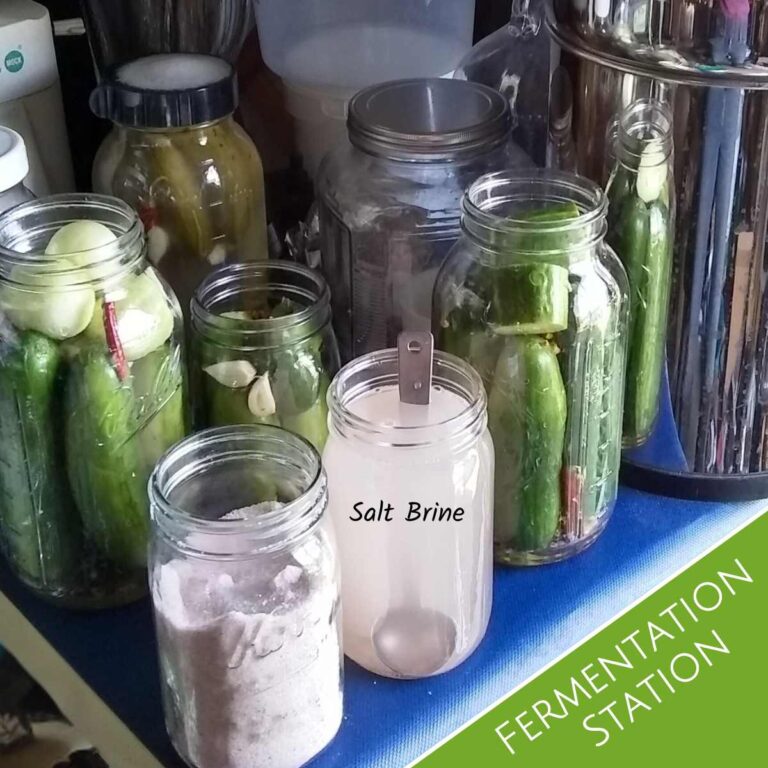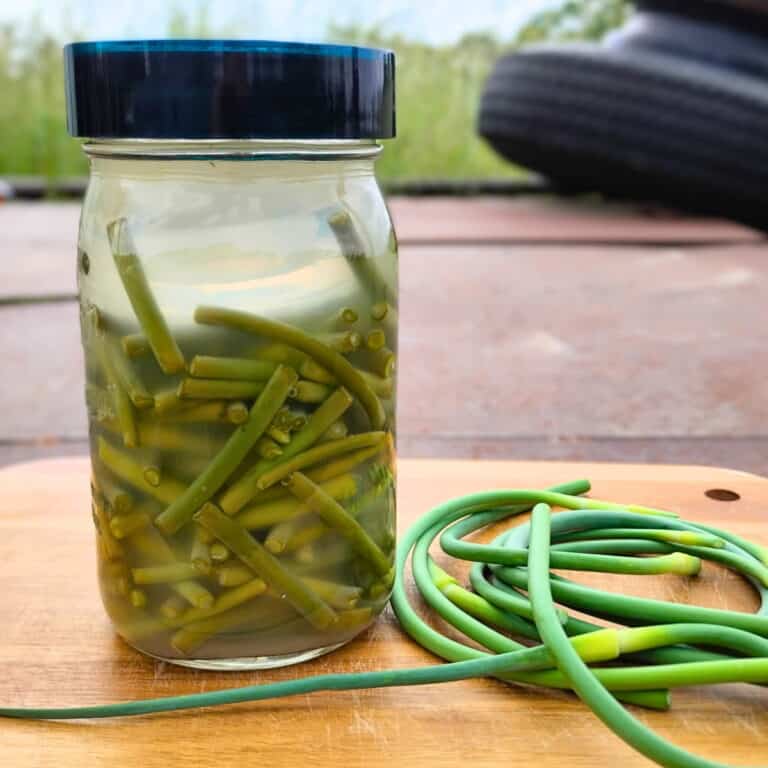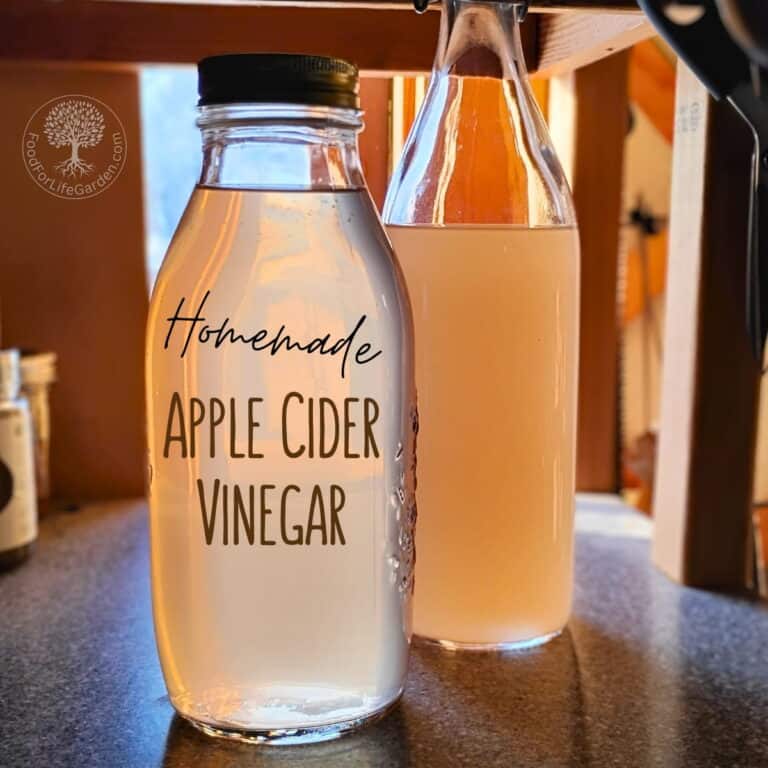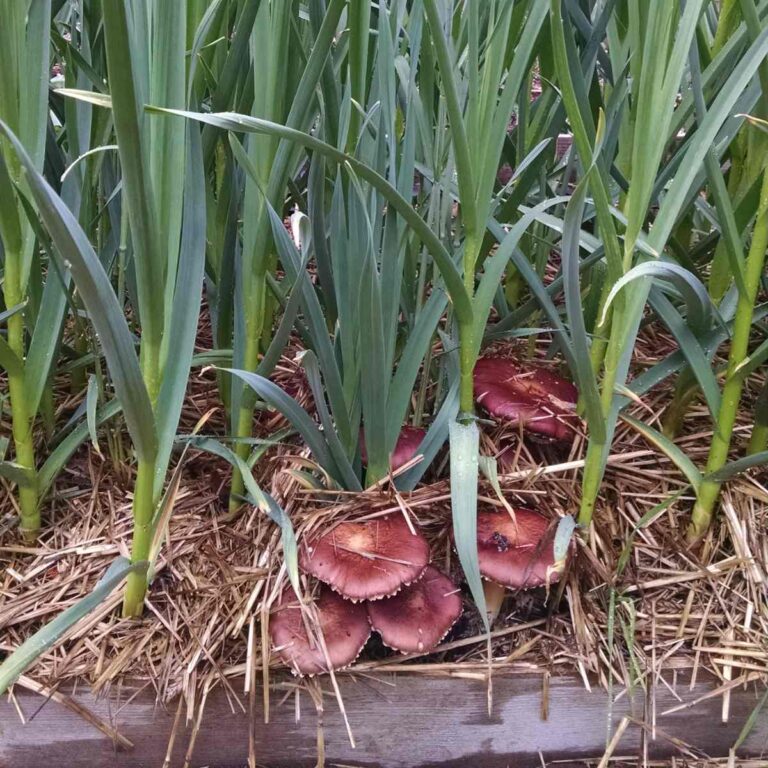Fire cider recipe is a tonic you need to try that is traditionally used for immune support and more. Learn to make your own and customize it.

This post contains affiliate links, which means I make a small commission at no extra cost to you if you click through and make a purchase. See my full disclosure here.
This fiery hot, sour and sweet concoction has become quite famous. Fire cider is a tonic that consists of herbs, fruits, spices, and vegetables, which are infused in a vinegar base for a time, strained, and sweetened with honey.
The result is a potent tonic that can possibly help with many health complaints. But it is most often used during cold and flu season to support the immune system and improve immune response. Taking this tonic might help to prevent illness, or at the least provide relief from the discomfort and symptoms of a cold such as congestion, sore throat and more. Let’s find out what the fuss is all about!
Fire Cider, The People’s Medicine!

If you never had Fire Cider, may I have the pleasure of introducing you?
Let’s explore this awesome folk remedy, which is rooted in the medieval medicinal practices of making vinegar based herbal extracts. These once filled the shelves in the apothecaries of Old World Monasteries. And I’m sure many other cultures had similar preparations too.
According to legend, the most well-known four thieves herbal vinegar of those days, has kept a group of thieves healthy during the plaque, when everyone around them succumbed to the disease, and this herbal vinegar has gained world-wide fame.
Back then, vegetables were preserved with vinegar. And herbs were extracted in a vinegar solvent for various ailments and made shelf stable and convenient to use for long term. The vinegar itself is not just a preservative and solvent, but comes with it’s own impressive set of health benefits too.
The Birth of Fire Cider
This folk remedy was first named decades ago by Rosemary Gladstar, a renowned herbalist. She first created this tonic in the 1980s. It was based on an original recipe that she developed with peers during her days in college. It has since gained a cult following.
The fire cider name even ended up in litigation, when a company went to trademark the name. Many, who prepared this tonic and sold it as ‘fire cider’ had to rename their concoctions to stay legal. This was contested by Rosemary and many fire cider followers and the company lost.
So the name fire cider is once again free to use by anyone. And Ms. Gladstar coined her fire cider “The People’s Medicine”. Fire cider is now prepared in all the world and its popularity is stronger than ever.

If you are interested in reading more about fire cider and get lots of recipes, you can get Rosemary Gladstar’s Fire Cider book.
This Fire Cider Recipe Is Customizable!
Fire cider is much like the ancient vinegar extracts. We select a blend of herbs and spices and use them to infuse raw vinegar. It can be turned into an oxymel with the addition of honey. The term oxymel is derieved from the Greek word oxymeli meaning acid and honey.
These ingredients can be changed up and adapted to every person’s specific needs, taste, and preference. Fire cider today is more a concept than a specific recipe.
Recipes for fire cider are as eclectic as the people who make it. We all use our own preferred ingredients and most of us, I’m sure, change it up over the years and with the seasons, depending on taste, need, availability of ingredients, and preference.
Mine are always different. I have a few ingredients that I always use, but the rest is fair game. So are the ratios. So what I will do here, is give you my base recipe, and then a list of options that you pick from to enhance your fire cider and target different goals.
Why you’ll love fire cider

While the health claims of fire cider do not have scientific validation, most certainly because there are so many variations of this preparation, here is what Rosemary Gladstar writes in Mother Earth News:
“We can tell you this for certain: This strong vinegar tincture extracts healthful phytocompounds from a variety of medicinal plant materials. Most of these ingredients contain phytochemicals known for their strong digestive, antiviral, antiseptic, and/or decongestant properties”.
Benefits Of Fire Cider:
- Fire cider is ultra adaptable and easy to make.
- Fire cider can possibly help ward off colds and flus and is known to relieve the symptoms.
- It is easily adaptable towards targeting many health issues with selective ingredients. Choose ingredients that can benefit you the most. Ginger, garlic and cayenne are normally always added, but you can choose to add turmeric to combat inflammation, rosemary to help with focus and memory, horseradish to help with congestion, citrus for vitamins and heart health, rosehips for pain and inflammation, and so on.
- Fire cider has ingredients with strong antiviral, and antibacterial properties. These can possibly fight off viruses and bacteria before they even penetrate into your body, and they can fight infection.
- Fire cider contains powerful antioxidants that provide effective immune support and help fight free radicals to reduce oxidative stress. Some studies suggest that fire cider ingredients might have anti-cancer properties.
- Almost all fire cider ingredients have anti-inflammatory properties. I like to load mine up with these. Inflammation is the cause for so many chronic diseases, and since I am taking fire cider daily, I like to have such herbs as rosehips, turmeric, cayenne, and ginger in my tonic, that are all known for their strong inflammation fighting properties.
- Apple cider vinegar and other ingredients can help with weight loss when combined with a healthy diet and excercise. And they might also balance blood sugar levels.
My Fire Cider Recipe
I formulated my recipe with ingredients that are known to help with cold and flu prevention, symptom relief and immune support, and to target inflammation.
Equipment:
A Half Gallon Jar With Lid – use a half gallon jar with a tight fitting lid that is not metal! Or use a piece of parchment between the lid and the jar. Trust me in this! I almost lost a batch a few years ago, because I couldn’t open the fused on metal lid, lol. It took days of soaking with oil and in warm water to finally get it off with the help of some tools.

So now I prefer to use my Bormioli Fido Jars for making fire cider. Easy peasy and it looks so pretty!
Ingredients:
Here are the ingredients I use in my fire cider and optionals. I’ve included some of the popular health benefit properties of each for your reference. And I listed a few source references throughout and at the end of this post. And I’ll also link to other pages on my website where you can dive deeper into some of these herbs if you like.
Try your best to get organic ingredients, so you don’t extract unhealthful chemicals or pesticides, or have your beneficial bacteria harmed.
Organic Raw Apple cider vinegar (with the mother)
Possible Benefits: Regulates blood sugar, weight loss aid, heart health, skin health, digestive health, bone health, immune function. Vinegar has also been found to fight staphylococcus aureus and resistant E. coli. (source)

This is the solvent that will extract all those wonderfully healthy properties from the other ingredients. And apple cider vinegar has many of its own benefits. Be sure to get raw vinegar ‘with the mother’!
You can certainly use homemade vinegar. However, since the strength can vary I would suggest you test the acidity with litmus paper or other ph tester if you’re in doubt. A weak vinegar will not extract well and might spoil.
To arrive at the 5% acidity that is standard for most vinegars, your ph needs to be 2.4 or lower. I tested my homemade vinegar and it was 1.14. So that was plenty acidic. If yours is a little higher than 2.4, you can still make your fire cider with homemade vinegar, but keep it in the refrigerator to ensure that no nasty things grow in it, and let it extract longer.
Organic Ginger:
Possible Benefits: Anti-inflammatory, digestive aid, antioxidant, immune support, antimicrobial, anti-fungal, might regulate blood sugar, nausea relief, weight-loss support, and heart health benefits. (source)
I always like to add Fresh Organic Ginger to fire cider. It’s one of the original classic ingredients, and I feel it’s one of those that you don’t want to leave out.
However, if you’re allergic or can’t find any, feel free to omit and replace it with another herb.
I use ginger with the skin on to get the benefits of the complete herb. Find out more about Ginger’s many health benefits in Fermented Ginger Honey or Health Benefits of Ginger Beer.
Organic Onions
Possible Benefits: Antioxidant, immune support, heart health, bone health, regulates blood sugar, anti-inflammatory, anti-cancer, anti-fungal, promotes healthy gut bacteria, good source of potassium, vitamin B6, and folate. (source)

Onions are another ‘must-have’ in fire cider. They are packed with nutrients. And onions are immune boosting and inflammation fighting.
I use my onions skin and all. If the skin is clean, go ahead and use it. It contains benefits too. You can also save up the onion tops when you chop onions for your meals and throw them in instead of whole onions.
Another way you can get more onions into your diet is with my Fermented Onions. If you want to grow your own, you can go to my step-by-step Growing Onion Guide. Check it out!
Organic Garlic
Possible Benefits: Strong antioxidant, anti-inflammatory, cardiovascular health, antimicrobial, antiviral, anti-fungal, immune support, promotes healthy gut bacteria and digestive functions, lowers risk of chronic diseases. Has been found to prevent viruses from replicating and it can protect against illness, viral or bacterial in nature. May prevent Alzheimers and dementia. Detox of heavy metals. (source)
I looove garlic. Garlic goes into everything! Well, just about, but certainly into fire cider. It’s an essential! Brimming with so many strong beneficial properties, it’s one of the main reasons for making fire cider in the first place.
You can use the skins too if you want to save yourself the chore of peeling. Just chop it up coarsley, and try to get it covered with vinegar within 10 minutes to capture the allicin. If you can’t get organic garlic locally, you might try the Azure Standard buyer’s club if they deliver to your area.
I’ve got a long list of garlic’s benefits with more detail in my Fermented Garlic and Honey post. Another way to get more garlic into your diet is by making fermented garlic paste. And if you want to grow your own to have healthier bulbs, check out my guide to Growing Your Own Garlic!
Organic Hot Peppers, such as Jalapeños or Cayennes
Possible Benefits: Anti-inflammatory, immune support, antioxidant, nutrient packed, improves digestion, may increase metabolism, anti-fungal, anti-cancer, pain-relieving properties, heart health, blood sugar control, cognitive functions. (source)

For the sake of their fiery nature, hot peppers are an important addition to fire cider. Spicy peppers have numerous health benefits and they are appreciated for their warming quality.
Hot peppers can help stimulate or wake up your receptors to all the healing benefits in fire cider, and it warms you when you feel chilled and can improve circulation when you need some life back in your extremities.
The original recipe calls for jalapeños, but I used my homegrown dried cayennes this time. You can leave the little caps (calyxes) on. They are nutritious too.
It helps to crumble or make a slit in the pepper for the vinegar to penetrate it. Here is a source for crushed dried chilies if you want to purchase them.
Organic Horseradish
Possible Benefits: Antibacterial, anti-fungal, anti-inflammatory, digestive support, promotes cardiovascular health, anti-cancer, immune support, helps clear up congestion and respiratory infections. (source)

You can use horseradish with the skin on, just scrub it a little and either slice it thinly or grate it. Do be prepared to cry and, if possible, wear safety glasses and a mask.
I didn’t and man, it was brutal. Think onions on steroids! Thankfully you don’t need much of it, but it sure clears the sinuses, yikes! I was grating some extra horseradish to make fermented horseradish and cried me a river doing it.
In case you can’t get fresh organic horseradish, you can use horseradish powder.
To learn more about horseradish benefits and for more horseradish recipes go to Prepared and Fermented Horseradish. You’ll find 3 awesome recipes there.
Unfiltered Raw Honey (Organic if you can get it)
Possible Benefits: Antioxidant, antibacterial, antiviral, infection fighting, immune support, anti-inflammatory, prebiotic, digestive aid, feeds beneficial gut bacteria, heart health, regulates blood sugar, relieves coughs and sore throats, improves sleep. (source)

Honey is almost a must-have, it rounds out the flavor, cuts the acidity of the vinegar and adds a plethora of extra health benefits. However, honey should never be given to young children under 1 year old. And some people are allergic to honey or can’t have it for one reason or another.
If you want to make this for the family and feel that honey might pose a problem, leave it out and just add a little to individual servings as you wish. I used to make fire cider without honey for years in the past and it works great nonetheless.
You can get Organic Honey here, or even better, try a local bee keeper who uses natural bee keeping methods and does not use harmful chemicals and fungicides. Be sure that it is pure and does not have additives, and that it is raw and unfiltered.
To learn more about the health benefits of honey, go to my pages where I make fermented honey and garlic and fermented ginger honey, both are great recipes that can help with colds, coughs and congestion too.
The Optionals That I Like To Add
These ingredients are not in the original recipe that Rosemary Gladstar published, but they are things I like to add into mine. Feel free to mix and match or just leave them out.
Organic Turmeric
Possible Benefits: Anti-inflammatory, digestive aid, antioxidant, immune support, antimicrobial, anti-fungal, might regulate blood sugar, relieve nausea, support weight-loss, and heart health. (source)
Turmeric is a must have in my fire cider. I love it for its anti-inflammatory benefits. Inflammation is the root cause for many chronic health problems and so I like to address inflammation as much as possible with my diet.
I try to use fresh turmeric rhyzomes, but it’s rare that I find organic turmeric in my area. Dried works good too and I like to have a lot of the granulated kind on hand for teas all winter.
Always add a pinch of black pepper when using turmeric, to increase absorbance!
Check out my post on fermented turmeric paste for a deeper dive into the health benefits of turmeric and you can learn how to make fermented turmeric paste, a convenient and healthy supplement and seasoning. And make your own convenient supplement for when you’re on a go: Turmeric Tincture.
Organic Lemons or Oranges
Possible Benefits: Antioxidant, Immune support, antibacterial, anti-fungal, digestive aid by stimulating production of digestive juices, promotes healthy bowl movements, heart health, supports weight management, skin health, reduces kidney stone risk, anti-cancer, lowers blood pressure, stress reduction and mood enhancer, anti-diabetic, improves absorption of iron for help with anemia. (source, source)
I love to include a few organic lemons or oranges or even better, both. When I made my fire cider today, I had just one whole lemon, but I always save the peels of lemons and oranges and dry them, so I added some dried orange peels as well.
I was considering adding a fermented lemon too, which would have added the citrus benefits and the benefits of extra beneficial probiotics, but I ran out of room in my jar. I did add a little fermented lemon brine though, which contains the extracted benefits of lemon and the probiotics.
Black Pepper
Possible Benefits: Antioxidant, immune support, improved digestion, enhanced nutrient absorption of curcumin in turmeric and vitamin A for example. Blood sugar control, cardiovascular health, anti-inflammatory, boosts metabolism, cognitive function, reduces cough and congestion, skin and hair health. (source)
In this fire cider, I use black pepper primarily to aid with absorption of nutrients. It does not take much. I just added about a tablespoon or so of the black pepper corn. Do use whole pepper corn or freshly ground to get the benefits. Pre-ground pepper looses the health benefits quickly.
Rosemary
Possible Benefits: Antioxidant, immune modulator, cognitive function, cardiovascular health, antibacterial, antiviral, infection fighting, anti-inflammatory, pain, swelling, digestive health, regulate hormonal levels and may help with menopause and PMS, hairgrowth. (source)
I love rosemary and was totally going to put it in my fire cider today, but I couldn’t find my jar of dried rosemary. Bummer! I’ll keep looking and when I find it, it most certainly will go into my fire cider! For many reasons, see benefits list!
Ceylon Cinnamon Sticks
Possible Benefits: Antioxidant, anti-inflammatory, cognitive function, heart health, anti-cancer, supports gut health, fights harmful bacteria, antimicrobial, anti-fungal, metabolic health, lower blood sugar levels, dental health. (source)
Cinnamon is another must-add for my fire cider. I love to add it for it’s strong support of the heart, cognitive support, and because it is anti-inflammatory. I use only Ceylon cinnamon. In all my research I found that it is the healthier kind vs. cassia (Korintje) cinnamon.
Mineral Salt
Mineral salt is not in the original recipe, but I like to add a pinch for essential minerals that are not available elsewhere, or I add a little fermented brine to my fire cider, which has mineral salt in it already.
Salt also helps to round out the flavor and cut the acidity of this extract.
I recommend mineral rich Redmond’s Real Salt or Himalayan pink salt.
Thyme
Possible Benefits: Antioxidant, anti-inflammatory, immune modulator, digestive aid, antibacterial action in the gut, respiratory support, soothe sore throats, relieve coughs, decongestant, heart health, bone health, antibacterial, antifungal, improve memory, reduce stress, relaxing. (source, source)
Thyme is so great for your health. It is strongly anti-inflammatory, antioxidant and antibacterial. And it is really great for sore throats and inflammation of the respiratory system.
And like other herbs it is an immune modulator and so it can either boost or suppress the immune system, depending on what the body needs at the moment.
It can help the body respond dynamically to various stimulants, such as infections, allergens, or autoimmune disorders and to restore balance, enhance the body’s defenses, or suppress overactive immune responses.
Cloves
Possible Benefits: Antioxidant, anti-inflammatory, antimicrobial, fights bacteria and viruses, an antiseptic for wounds and infections, immune modulator, digestive support, oral health, regulate blood sugar levels, cognitive functions, immune support. (source, source)
Cloves too are strongly antioxidant, anti-inflammatory and antimicrobial. And they are effective immune modulators as well.
Star Anise
Possible Benefits: Antioxidant, rich in polyphenols and flavonoids to fight oxidative damage, anti-inflammatory, antimicrobial, powerful digestive support, helps with gas, colic, and indigestion, analgesic properties, antifungal, anit-cancer, reduce anxiety, promote lactation. (source)
Star anise is highly regarded for its antiviral properties due to its shikimic acid content. This is the active ingredient in a popular influenza medication.
It is a rich source of flavonoids and polyphenols and it’s antibacterial properties have been effective in treatments against drug resistant bacteria.
Astragalus (Milkvetch)
Possible Benefits: Immune support, antioxidant, anti-inflammatory, may help with respiratory infections, colds and flus, adaptogen for stress relief and disease protection, kidney health, cardiovascular health, anti-aging, chronic fatique syndrome, recovery from chemotherapy, diabetes, anti-tumor (melanoma and leukemia), seasonal allergies. (source)
I like to use this in my fire cider as an adaptogen. Adaptogens should be switched out after a period of time, so if I make a second batch, I would use a different adaptogen in it and switch between the two every couple of months, and use ashwagandha, ginseng, rhodiola, or reishi mushroom.
Source for organic astragalus
Berries
Berries are known for their antioxidant properties. I won’t list all the berries or benefits here, but know that berries are a great option for fire cider. I didn’t use any berries, but if I hadn’t run out, I would have liked to add schisandra berries.
Try cranberries, blueberries, schisandra (strong properties for mental clarity, energy and memory), juniper berries, goji berries, aronia berries, or black berries. You can also try raspberries, black currants (this link is for black currants of the ribes family, not zante currants!), and others.
You can add elderberries with caution. Generally, elderberries should not be consumed raw, so you might want to cook them first. If you use them raw, be sure to use only black or blue elderberries.
Elderberries are usually tolerated by most in small amounts, many people eat them raw, but the berries do contain cyanide, and they can cause side effects in some cases. Cooking will get rid of the toxin.
Rosehips
Possible Benefits: antioxidant, reducing oxidative stress and risk of chronic diseases, heart health, high in vitamin C, protects cells against sun damage, anti-inflammatory and pain relief with osteoarthritis pain, anti-diabetic, help with fatty liver disease, kidney stones and depression. (source)
Rosehips are full of potent health benefits and great for heart health and osteoarthritis pain. I did add some in my fire cider.
Nasturtium flowers

Nasturtiums are also a good addition to fire cider, and, in fact, if you can’t source horseraddish, try adding nasturtium seeds to your concoction if you have them growing in your garden.
Sage, Oregano, Fennel seed, Cilantro, Coriander seed, Lemon balm, Hyssop, Dandelion flower petals or greens…
The list is endless. You can add any edible spices, herbs and seasonings to your fire cider if you feel they would make a great addition.
Sage would be amazing for it’s respiratory benefits and oregano is a well known anti bacterial that can fight infections. And fennel is great for its digestive health properties. Feel free to experiment and make your fire cider truly yours!
If you’d like to grow many of these herbs yourself, be sure to read about starting an apothecary garden with 25 herbs. You’ll find more herbal benefits, growing instructions and what plant parts are used.
Instructions:
Chop, slice or grate your ingredients.

Fill the jar to within 3-4 inches from the top with ingredients.

Mine got a bit too full. It’s easy to get carried away, I added a little of this and a little of that even after I thought I was done.
Pour the vinegar over the ingredients, right to the top of the jar.


Seal the jar

Let it infuse for 4-8 weeks in a coolish, darkish spot.
Shake every day or as you remember.

After at least 4 weeks (6 is better), strain the ingredients and squeeze out as much juice as you can.
Bottle the liquid.

Add honey to the bottle if you elect to use it. Start with 1/4 cup of honey per quart of fire cider and adjust to taste.
It helps to warm the honey gently (don’t heat it over 120 degrees) and have the fire cider at room temperature, so they will mix well.
What Can I Do With The Strained Ingredients?
You can dehydrate the scraps. Then grind them up and use as a seasoning in soup, or blended into a smoothie, salad dressing or to marinate meat when mixed with a little wine. They would make a great immune boosting feed additive for your pigs or chickens too. Or you can compost it. It will actually act as a compost booster with all the good bacteria that is in it.
How To Use Fire Cider
The easiest way to use fire cider is by drinking a small shot of it each day, especially when you feel run-down or tired. And certainly, when there are colds and flus going around, or when you just aren’t feeling well.
If you feel a flu coming on, take small amounts of it throughout the day. I like to just put a few tablespoons full into a bottle of water and sip it every half hour or so throughout the day.
Try a little as an aperitif after a heavy meal too, to help with digestion.
I believe that it is better for your system and your teeth to dilute it a little. That acid from the vinegar can be irritating in your passages. I like mine in a bottle of water and I actually like my water better this way, with a little flavor in it.
You can also add it to salad dressings, vinaigrettes, smoothies, drizzled over your meats or vegetables. You could use it as marinades or in dishes, but cooking it would kill the beneficial microbes and probiotics that are part of the benefit in fire cider.
Summary

I hope you will give fire cider a try. It is so easy to make and it totally works for me when I feel congested and under the weather. Fire cider is packed with ingredients that have awesome benefits for your well being. The vinegar extracts these properties and adds many of its own to boot.
Fire cider has a passionate following and I think you’ll see why when you start making own.
I’d love to hear your thoughts on fire cider! And if you get to make it, be sure to leave me a message below. What are your favorite ingredients for fire cider? If you have any questions, don’t hesitate to ask me!
I’d like to invite you to join my food for life community. Sign up today to get notified of new content, recipes and ideas and get helpful tips and more!
Disclaimer:
While opinions vary widely about different herbs, I am writing about my own experiences with herbs and what I found through years of research. I am not a doctor and am not giving medical advice. However, this is how I use herbs and what I feel confident to present for informational content.
Be aware that anyone could potentially have an allergic reaction to a new food or herb, and so start using a new herb in small doses and watch for any signs of discomfort. Also, do consult with your health practitioner if you take any medication, have a serious condition, or are pregnant or nursing.
More Sources and Resources
Medicinal Herbs, Rosemary Gladstar
Medical News Today, American College of Health Care Sciences, Science Direct, Nature.com scientific reports
More content like this
Homemade Apple Cider Vinegar – This lovely vinegar is made from apple scraps, not the actual apple cider. But it is just as effective, easier to make and uses all those leftover apple scraps or ugly apples.
Switchel Recipe – A refreshing electrolyte drink for hydration during summer activities.
Probiotic Fermented Lemonade Soda -A refreshing fizzy soda that will cool you down on hot days and support your gut health!
Prepared and Fermented Horseradish – Make your own prepared horseradish with homemade vinegar or ferment it. Bonus recipe: horseradish tincture. Great for digestion and sinus infections.
Purple Dead Nettle Tincture – Capture the many health benefits of foraged purple dead nettles in a tincture for year round use.
Turmeric Tincture Recipe – Make your own effective turmeric supplement, that is convenient to use and keep with you when you’re not home. A potent extract of the whole turmeric root.
Fermented Garlic – Lacto-fermented garlic paste is kind of a special food. It’s the ultimate convenience food and health supplement. But besides that, it gets better as it ages. Just like a fine wine.
Fermented Ginger Honey – Keep this potent fermented health food on hand. Use the powers of Ginger and Honey in a tasty syrup form that you’ll love.
Fermented Ginger Paste – A convenient way to have ginger on hand when you need some, either as seasoning in cooking or baking, or to use this powerful ally in your daily health routine.
Fermented Turmeric Paste – Make this convenient fresh turmeric paste for your wellness and as a convenient seasoning for your curries and other foods. Turmeric has so many benefits, find out all about it and why fermenting it makes it even better.
Fermented Garlic and Honey – A powerful combination of two all-star infection and sickness fighters. Make this easy remedy today and be ready for cold and flu season!
Health benefits of ginger beer Learn all about the awesomeness of ginger.
Switchel Recipe – A refreshing electrolyte drink for hydration during summer activities.
Fermented Onions – You’ll love these tasty, tangy onions. Try them plain or spiff up any sandwiches, salads and burgers with a ready supply of these onions sitting in your fridge.
Black Walnut Tincture – Black walnut has been used as a deworming tincture for a long time. Make your own with my recipe. I like to use it as part of my goat deworming routine with great results so far.

Fire Cider Recipe
Equipment
- A half gallon jar – With a tight fitting lid that is not metal! (or use a piece of parchment between the lid and the jar. I highly recommend a Bormioli Fido Jar for this.
Ingredients
Basic Ingredients
- 2 quarts Apple cider vinegar – homemade vinegar or a purchased organic raw vinegar 'with the mother'
- ½ cup Ginger – grated
- 2 Onions – sliced or chopped.
- 1 head Garlic – chopped
- 2-5 Jalapeños or Cayennes – chopped or use dried.
- ½ cup Horseradish – grated or thinly sliced.
- ½ cup Honey, or to taste – optional, but recommended. start with just ¼ cup and add more if you like it sweeter after tasting.
Optional Ingredients. Measurements are adjustable, use how much you prefer.
- ½ cup Turmeric – grated, sliced, or dried.
- 1-2 Lemons – thinly sliced.
- 1 Orange – thinly sliced.
- 1-2 tbsp Black Pepper – whole or fresh ground.
- Rosemary – a few sprigs
- 2-3 Cinnamon Sticks
- ¼ tsp Salt
- Thyme – a few sprigs
- Cloves – about a tablespoon or less
- Star Anise – a small handful
- Nasturtium flowers – just a handful or more
- ½ cup Rosehips, dried
- ½ cup Astragalus
- Berries
- Sage, Oregano, Fennel seed, Cilantro, Coriander seed, Lemon balm, Hyssop, Dandelion flower petals or greens…
Instructions
- Chop, slice or grate your ingredients.
- Fill the jar to within 3-4 inches from the top with ingredients.It's easy to get carried away, don't pack the ingredients in too tight.
- Pour the vinegar over the ingredients, right to the top of the jar.
- Seal the jar.
- Let it infuse for 4-8 weeks in a coolish, darkish spot.
- Shake every day or as you remember.
- Strain the ingredients.
- Bottle the liquid.
- Add honey to taste.
Notes
What Can I Do With The Strained Ingredients?
You can dehydrate the scraps. Then grind them up and use as a seasoning in soup, or blended into a smoothie, salad dressing or to marinate meat when mixed with a little wine. They would make a great immune boosting feed additive for your pigs or chickens too. Or you can compost it. It will actually act as a compost booster with all the good bacteria that is in it.
How To Use Fire Cider
The easiest way to use fire cider is by drinking a small shot of it each day, especially when you feel run-down or tired, when there are colds and flus going around and when you just aren’t feeling well. If you feel a flu coming on, take small amounts of it throughout the day. I like to just put a few tablespoons into a bottle of water and sip it every half hour or so throughout the day. Try a little as an aperitif after a heavy meal too, to help with digestion. I feel that it is better for your system and your teeth to dilute it a little. That acid from the vinegar can be irritating in your passages. I like mine in a bottle of water and I actually like my water better this way, with a little flavor in it. You can also add it to salad dressings, vinaigrettes, smoothies, drizzled over your meats or vegetables. You can season your cooked foods with it too, but know that high heat will kill the beneficial microbes in the fire cider.Summary
I hope you will give fire cider a try. It is so easy to make and I know it helps me when I feel congested and under the weather. Fire cider is packed with ingredients that have healthy properties to benefit for your well being. The vinegar extracts these properties and adds many of its own to boot. Fire cider has a passionate following and I think you’ll see why when you try your own.Pin This Post

Shop This Post
Ball’s half gallon jar
Bormioli Fido Jar
Bragg’s raw vinegar ‘with the mother’
Litmus paper
Crushed dried chilies
Horseradish powder
Turmeric granules
Whole black pepper corn
Dried rosemary herb
Ceylon cinnamon sticks
Redmond’s Real Salt
Himalayan pink salt
Organic thyme
Organic cloves
Star anise
Organic astragalus root
Dried blueberries
Dried schisandra berries
Dried juniper berries
Goji berries
Aronia berries
Dried black currents (this link is for black currant ribes, not zante currants!)
Dried elderberries
Rosehip shells
Sage
Oregano
Fennel seeds
Organic honey – this is a very nice honey that I have bought many times.
Fresh Organic Ginger – get organic ginger at Azure Standard. They also carry organic honey, turmeric, cinnamon, lemons and more.
Rosemary Gladstar’s Fire Cider book
Medicinal Herbs, Rosemary Gladstar







Thanks for visiting here! I love fire cider and I hope that I got you interest in it! And remember that you can ask any questions right here in the comments and I’ll answer them as soon as I can!
I have been wanting to try this! Loved your recipe and explanation.
Thank you for saying so! I hope you get to try it, I think you’ll love it!
I definitely need to try this recipe out!
Thanks for stopping by Ashleigh, I hope you get to try it!
It was great to read about the history of fire cider! So much info in one post – thank you!
You’re welcome! Thank you for commenting, I appreciate your visit!